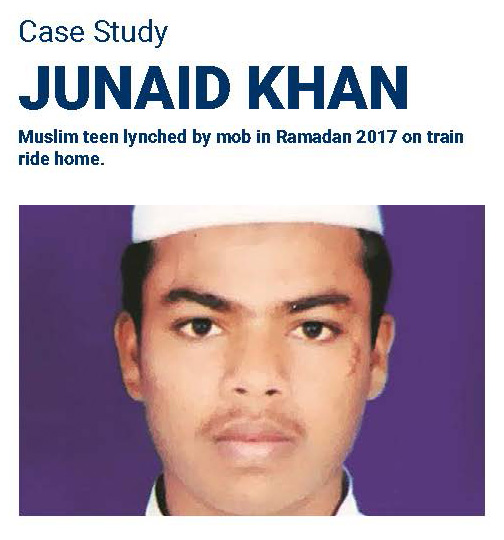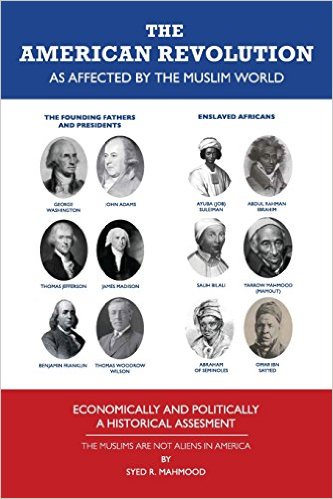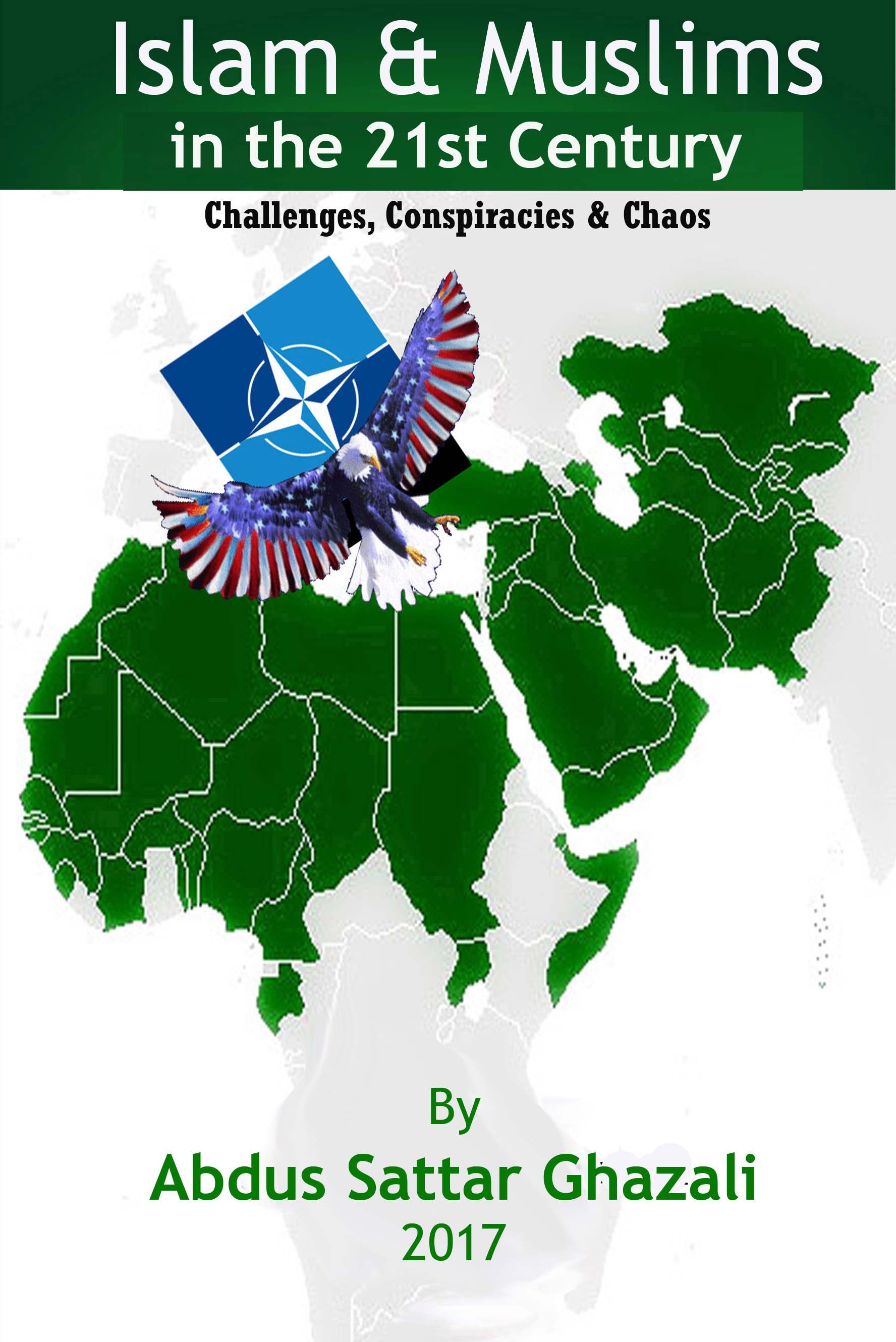Berkeley University study of Islamophobia in India highlights plight of Muslims
Junaid Khan: Muslim teen lynched by mob in Ramadan 2017 on train ride home:
One significant case in 2017 was that of sixteen-year-old Junaid Khan. Khan was a young student home from school for the Muslim religious holiday Eid. On June 23, Khan and his brother left their Khandawali village, district of Palwal, Haryana headed for Delhi by train to shop for the Eid holiday. As he was returning home with his brother and two friends, he was lynched to death by a mob of young men on a public train.
They flung our skull caps, pulled my brother’s beard, slapped us, and taunted us about eating cow meat. Beef is not even cooked in our village. Once we reached Ballabhgarh, they took out knives. They were older than us — probably in their 30s — so we couldn’t do anything,” Shaqir Khan Junaid’s other brother Hashim who was also attacked recounted that the initial attack began with about 20-25 men but that many jumped in thereafter shouting “you are Muslims, you are anti-nationals.” No one intervened to stop the violence.
In a video by The Quint, Khan’s family and friends shared their memories of Khan as a young man who always had a smile on his face, memorized the entire Quran and led his community in prayer and who dreamed of becoming an imam at the masjid one day. But confusion and fear were also expressed among the community as were concerns that his murder has brought to reality.
Junaid’s grieving mother Saira asked, “how can any random stranger do such a thing?” Mohd Azah a neighbor stated that “people are scared here..they are worried that something like this might happen to them...or our children who study in the city...are also scared to go to college” and Khan’s uncle Abdul Sayyid said “we’ve never seen such hatred in India before ...they call us ‘Pakistani’ that’s wrong...we are also Indians[...] this discrimination began after the BJP came to power.”297 He also explained how the murder has divided this community from their Hindu neighbors with whom they used to visit and celebrate. He recalled how they did not come to the Eid following Junaid’s death.
Locally, the lynching of young Junaid led to public mourning by his predominantly Muslim community. They did not celebrate the Islamic holiday of Eid, the celebration marking the end of the Ramadan fast that year. Additionally, the villagers and Muslims in neighboring areas wore black bands around their arms on Eid in solidarity and a hashtag #blackeid was used to bring attention to the increasing mob violence targeting minority groups in India. One organizer stated that “silence is tantamount to complicity, especially at a time where the Khan’s murder and the photo of his lifeless body on a train platform also caused public outrage in India and gained worldwide attention. His lynching has also forced larger conversations around what has been called India’s shift toward ‘mobocracy.’ A Facebook post by filmmaker Saba Dewan regarding the lynching of young Junaid is cited as a source in the mobilization of an online campaign #notinmyname, as well as physical protest marches across India on June 28, 2017. The event page on Facebook describes Not in My Name as “a citizens protest against the recent spate of targeted lynchings of Muslims in India” and refers to the recent stabbing of Junaid Khan.302 The event page refers to the attacks on Muslims as “part of a pattern of systemic violence against Dalits, Adivasis, and other disadvantaged and minority groups across the country” and refers to the “brazen silence” that the government has exhibited around “heinous crimes.” Via the Facebook event, a call is made for the “citizens of India reclaim and protect our Constitution.” Similar protests were also reportedly held in London, Boston, and Toronto on June 29, 2017. While Modi has remained silent on the lynchings of Muslims, and members of the BJP selectively pay lip service on occasion, protestors have reportedly sent apologies to Junaid’s father via statements such as “we are together in your grief” and “we are sorry we could not keep your son safe.” Twitter users took to the social media platform to show support tagging their tweets with the #notinmyname hashtag.
However, the #notinmyname hashtag has drawn criticism from some in India as a distraction from the structural injustice and toxic Brahmanism at the center of the issue. In a recent opinion piece Rajesh Rajamani penned for The News Minute, he claimed that elite, liberals have utilized the #notinmyname hashtag to compartmentalize their own privilege, allowing them to benefit from their caste position while condemning the lynching of Muslims, rather than address the need to dismantle the problematic Brahmanical Hindu structure that both allows such violence and from which they benefit.
Official narrative claims that the attack that led to Junaid’s murder occurred due to an argument over a seat on the train, though the FIR acknowledges that the attack “took on a violent and communal hue.”308 However, the accounts of witnesses including Khan’s own brother who was severely beaten and injured in the same attack, clearly demonstrate that they were attacked because they were Muslim. Markers of identity such as skull caps, beards and accusations of beef consumption were factors in the attack, and the reason why no one district, in the state of Haryana, an area close to Junaid’s, three Muslim clerics were beaten under similar circumstances by a group of men. Similar to young Junaid, they too were not allowed by the men to deboard at their stop similar to Junaid’s case and the police have stated that this incident too could also be a ‘dispute over seats’ on the train, rather than targeted acts of Islamophobia.
Yet Khan’s murder does not appear in cow related violence data collected by seminal sources on the topic such as IndiaSpend, although several articles on Junaid’s lynching do refer to beef eating accusations made by the attackers, similar to those launched against those lynched in cow related mob violence. Again and again, young Junaid’s name constantly appears among and alongside that of Muslim victims of cow lynchings, debates on the topic of cow violence and in protests.
The police arrested six men shortly after the lynching who admitted to participating in the beating, but not the stabbing of Junaid. Yet the end of March 2018, less than a year after Junaid’s murder all of the accused have been released from prison except for the main person Naresh Kumar. The Indian Express reports that Junaid’s father has claimed that Haryana police helped Rameshwar Dass one of the two key perpetrators accused in the murder of Junaid, obtain bail by subverting the investigation.
Junaid’s murder resonated beyond spectacular or isolated incidents, it solidified a sense of ongoing vulnerability for Muslims engaging in everyday activities. The Quint collected tweets by young Muslims in India that reflect the fears and anxieties that they experience in the increasing climate of Islamophobia, and the tweets were read off one by one in a video. The fears expressed by young Muslims included:
carrying meat or eating any kind of meat in lunch boxes when traveling by train to visit family or returning to campus lest it be confused for beef and threaten their loves, giving Islamic salutations on the phone or keeping a beard or wearing certain clothing affiliated with Muslims.
The Tweets below were taken from the same thread used by The Quint around @AngellicAribam’s post on Twitter July 23, 2018. The tweets reflect a sense of being under siege as well as the need to self-discipline regarding their words and actions, such as public displays of Muslimness for themselves and family members. Some tweets specifically mention Junaid and also train travel while Muslim. Places of public transport such as the train in Junaid’s case and the highway in Pehlu Khan’s case indicate serious mobility issues for Muslims as they attempt to move from one space to another and engage in everyday activities such as school and work.

The Journal of America Team:
Editor in chief:
Abdus Sattar Ghazali
Senior Editor:
Prof. Arthur Scott
Special Correspondent
Maryam Turab
Your donation
is tax deductable.



